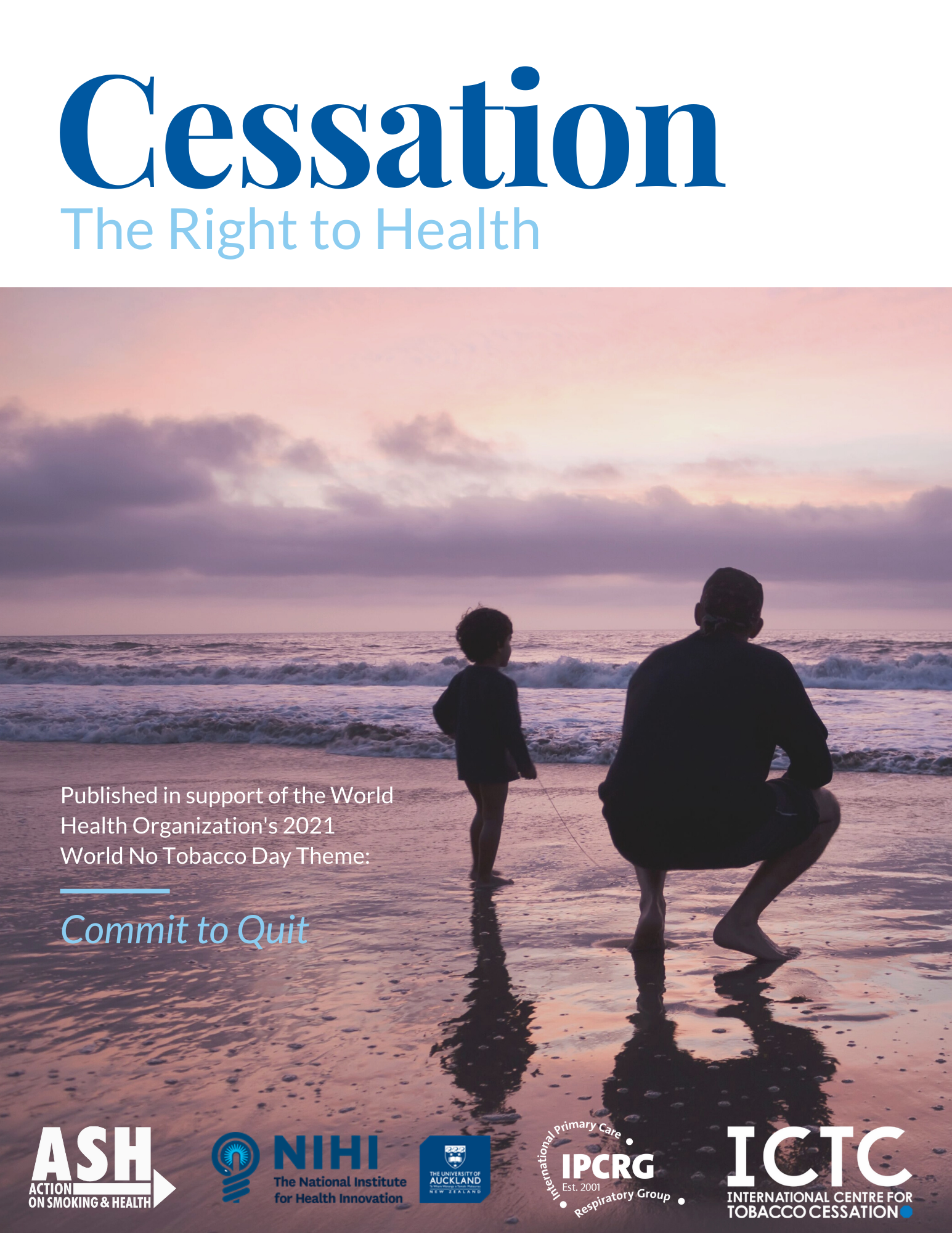Access to Smoking Cessation Support is a Human Right
ASH and ICTC Release a Report in Advance of World No Tobacco Day, May 31st
 Contact: Megan Arendt
Contact: Megan Arendt
arendtm@ash.org | (202) 390 – 9513
WASHINGTON, DC – May 18, 2021 – Legally-binding human rights norms implore or require governments to protect their citizens by implementing tobacco control laws and strategies to end the tobacco epidemic. Access to smoking cessation support is included as a human right and is highlighted in the report released today by the International Centre for Tobacco Cessation (ICTC) and Action on Smoking and Health (ASH). Cessation: The Right to Health was released to recognize the World No Tobacco Day (May 31st) 2021 theme of Commit to Quit.

Read the report here>
Worldwide, the tobacco epidemic has not abated; in fact, the number of deaths caused by tobacco has grown to over 8 million a year, far more than COVID-19 deaths, but receiving far less attention or support. If drastic action is not taken, the World Health Organization estimates that tobacco use will take one billion lives this century.
“Governments have seriously neglected cessation in their response to the tobacco epidemic,” said Martin Raw, the report’s lead author and Director of the International Centre for Tobacco Cessation. “We devote a lot of effort convincing people who smoke to quit, but do not then offer support to those who are addicted. Most people want to quit, but many need effective help to do so.” Professor Raw is one of the world’s leading experts on tobacco cessation and is a past recipient of the Luther L. Terry Award for Outstanding Individual Leadership.
The report argues that robust cessation support is a win-win for governments. Modest investment now to help people overcome their nicotine addiction will pay large dividends in the future by avoiding tobacco-caused diseases. The United Nations Development Program has estimated that the economic cost of tobacco use is US$1436 billion per year, equivalent in magnitude to 1.8% of the world’s annual GDP. By contrast, cessation support costs a few dollars per person.
 “We have a tendency to blame people who smoke for their predicament,” said Chris Bostic, Policy Director at Action on Smoking and Health. “But the real culprit is the tobacco industry, which intentionally targets youth with their highly addictive products.” The vast majority of adults who use tobacco started and became addicted as children. “We have failed our fellow citizens by allowing the industry to prey upon them as children,” added Bostic. “We have an ethical and human rights duty, as well as economic incentive, to help them quit.”
“We have a tendency to blame people who smoke for their predicament,” said Chris Bostic, Policy Director at Action on Smoking and Health. “But the real culprit is the tobacco industry, which intentionally targets youth with their highly addictive products.” The vast majority of adults who use tobacco started and became addicted as children. “We have failed our fellow citizens by allowing the industry to prey upon them as children,” added Bostic. “We have an ethical and human rights duty, as well as economic incentive, to help them quit.”
Coronavirus vaccination efforts offer a unique opportunity for tobacco cessation. “One of the most cost-effective measures we can take is for health care workers to ask about tobacco use and steer patients to support during their vaccination appointment,” said Professor Raw. “Billions of people are receiving their vaccine; we should use this unique opportunity to save them from falling victim to another pandemic.”
Action on Smoking & Health (ASH)
Founded in 1967, Action on Smoking and Health (ASH) is America’s oldest anti-tobacco organization, dedicated to a world with ZERO tobacco deaths. Because tobacco is the leading cause of preventable death worldwide, ASH supports bold solutions proportionate to the magnitude of the problem. https://ash.org.
International Centre for Tobacco Cessation (ICTC)
The ICTC was created by Professor Raw in 2015 to scale up his work helping countries improve their tobacco cessation support, and works with governments and other key stakeholders. Since 2010, Professor Raw has worked with New Zealand, Uruguay, Bolivia, Costa Rica, Mexico, Turkey, Jordan, Lebanon, Tunisia, South Africa, Georgia and Palau. More about ICTC here. Contact ICTC on WhatsApp: + 44 7791 120528 or via martin@martinraw.com



